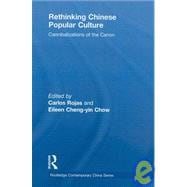
Note: Supplemental materials are not guaranteed with Rental or Used book purchases.
Purchase Benefits
What is included with this book?
| Introduction: The Disease of Canonicity (Carlos Rojas) | |
| Producing Popularity | |
| Perverse Poems and Suspicious Salons: The Friday School in Modern Chinese Literature | |
| The Formation of the Professional Author as a Figure in Early Twentieth Century Vernacular Fiction | |
| Serial Sightings: News, Novelties | |
| An Unofficial History of the Old Capital | |
| On the Literary Consecration of | |
| Canonical Reflections | |
| An Archaeology of Repressed Popularity | |
| Mao Dun, and Their 1920s Literary Polemics | |
| A Tale of Two Cities: Romance, Revenge, and Nostalgia in Two Fin-de-Si+?cle Novels | |
| From Romancing the State to Romancing the Store: Further Elaborations on Some Motifs in Contemporary Taiwan Literature | |
| Nostalgia and Amnesia | |
| Rereading the Red Classics: Bidding Farewell to Revolution and Red Nostalgia | |
| The Reproduction of a Popular Hero | |
| Memory, Photographic Seduction and Allegorical Correspondence | |
| Mutual Reflections | |
| Gender and Desire | |
| Popular Literature and National Representation: The Gender and Genre Politics of Begonia | |
| 'What is sentiment?' G++ Gifts, Love Letters, and Material Evidence | |
| Authorial Afterlives and Apocrypha in 1990s Chinese Fiction | |
| Table of Contents provided by Publisher. All Rights Reserved. |
The New copy of this book will include any supplemental materials advertised. Please check the title of the book to determine if it should include any access cards, study guides, lab manuals, CDs, etc.
The Used, Rental and eBook copies of this book are not guaranteed to include any supplemental materials. Typically, only the book itself is included. This is true even if the title states it includes any access cards, study guides, lab manuals, CDs, etc.